FREE Database – access 1030 ideas and start earning today.















eBiz Facts is reader-supported. When you buy with our links, we may earn a commission. Learn more.
You can usually tell if an affiliate marketing program sucks before you buy it.
If it’s a scam, these six things will tip you off:
If the course you’re considering checks most or all of those boxes, don’t sign up for it.
ClickBank University fails this first test, with obviously fake testimonials attributed to “Ronnie Biggs” and “Joe Bloggs” on the checkout page:
You should also check the success story of whoever’s teaching the course.
Too often, you’ll find that the instructor hasn’t had much success as an affiliate marketer themselves, despite their claims to the contrary.
I found this to be especially true of the courses on Udemy.
Prime example:
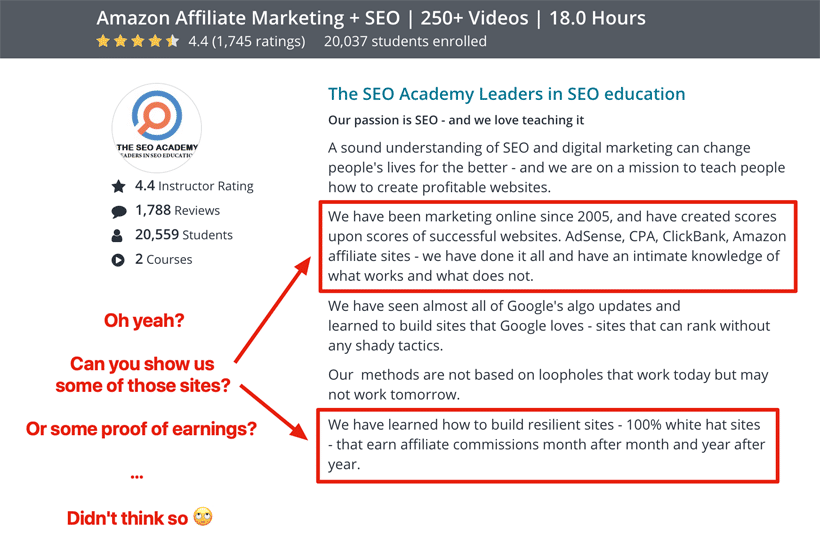
In contrast, the guys from Income School – creators of Project 24 (reviewed here) – proudly list the affiliate sites they’ve built over the years:
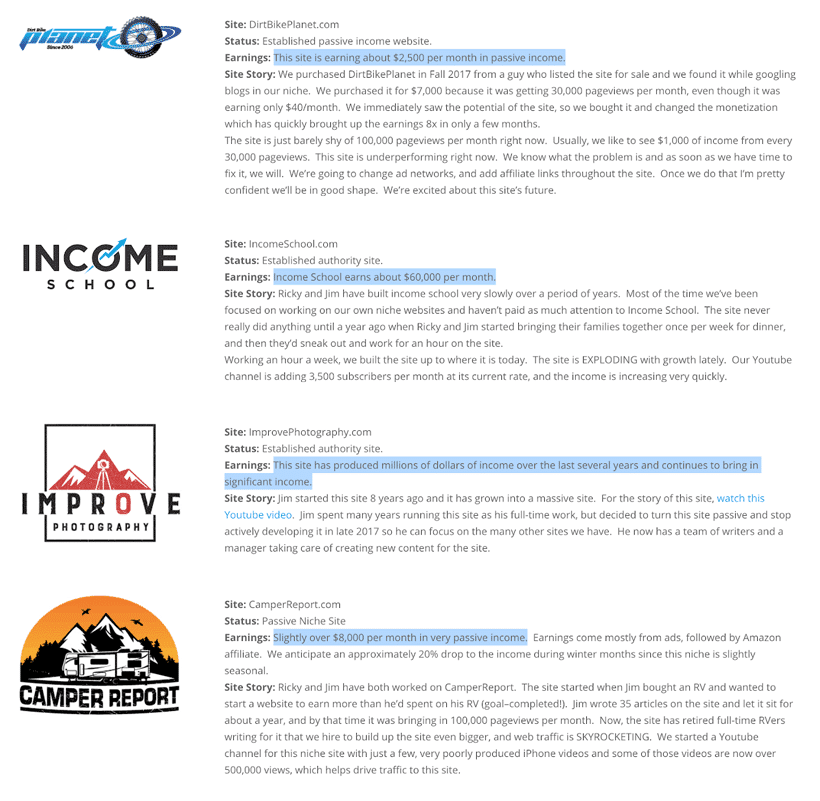
You can go check those sites and see for yourself that they’re legit.
(I also use a tool like Ahrefs to see if the traffic estimates line up with the claims being made.)
These three testimonials from the Wealthy Affiliate homepage are NOT measurable:

Those students all offer generic praise about the program, but no specifics about how much affiliate income they’ve earned thanks to the training.
Contrast that to the kind of testimonial you see on the sales page for The Authority Site System, which speaks to actual $$$ earnings:

It’s okay if you see a mix of measurable and non-measurable testimonials for a course: that’s perfectly normal.
But if the vast majority of the testimonials offer generic praise without reporting tangible results, that’s a big red flag.
Here’s the instructor of a top-rated course on Udemy showing off (presumably) the best results of his students:
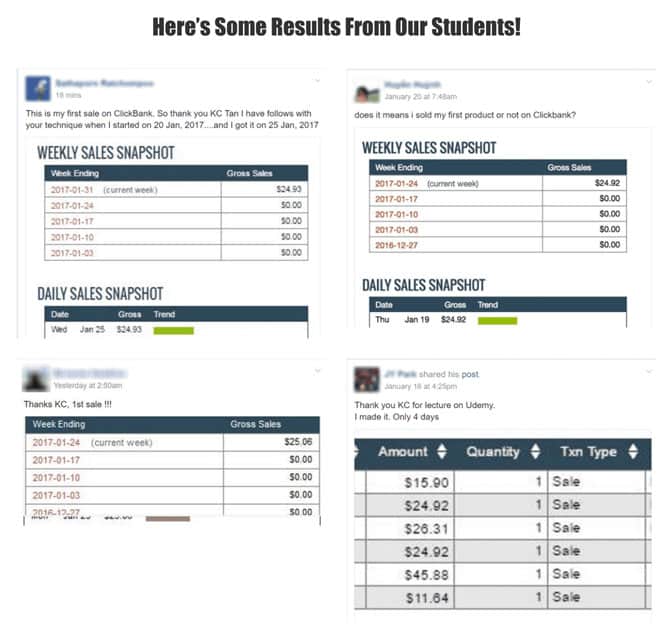
Nice that he’s helping people get their first sales on ClickBank – albeit back in 2017 – but there’s little indication that he’s helping people earn significant or consistent affiliate income.
More like pocket money.
What you really want to see from an affiliate marketing training are reports of at least a few students absolutely crushing it.
Like this Authority Hacker student:
That’s pretty rare though.
More realistically, you should expect to see reports of students steadily growing their affiliate income.
Authority Hacker has plenty of those, too:
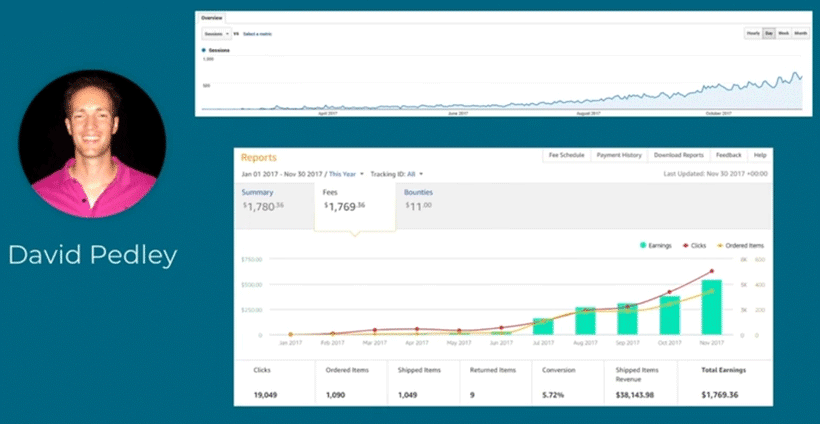
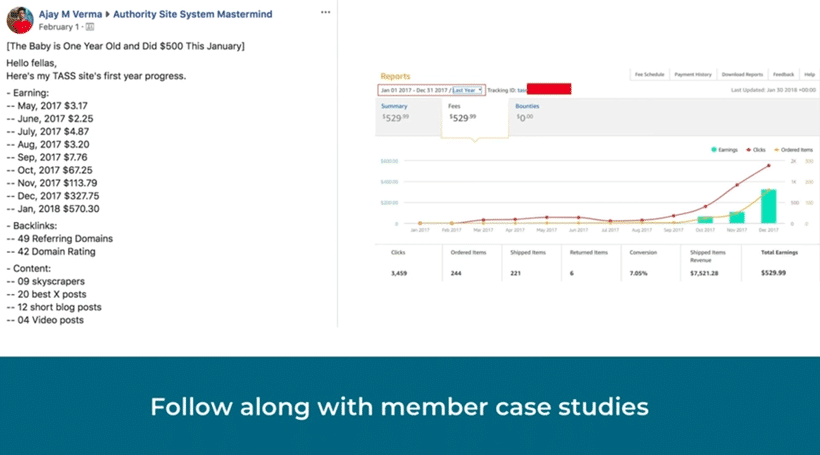
ClickBank University will show you tons of screenshots of student earnings… from 2016 😕
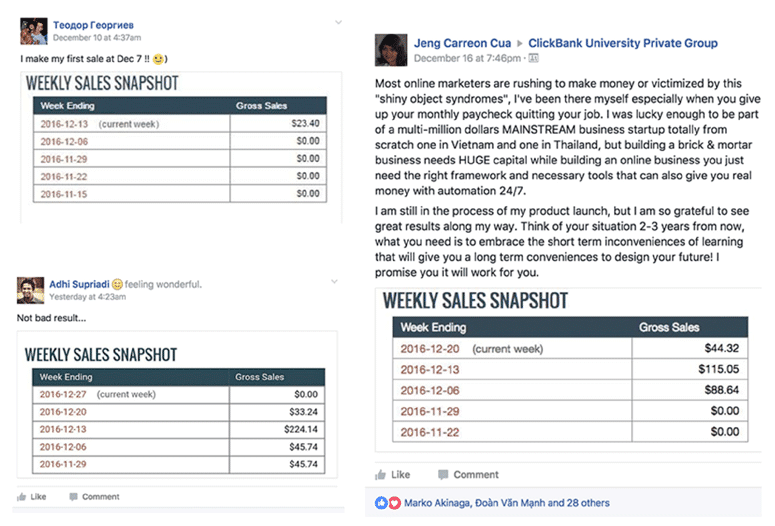
A few dated screenshots is no big deal. But if they’re not showing you ANYTHING from the past year or two, that’s a red flag.
Take it to mean that what they’re teaching no longer works. Or they can’t be bothered to keep their marketing materials up to date.
Either way, not a good sign.
Also, if someone shows you an earnings screenshot that DOESN’T have any date displayed, take it with a grain of salt.
One guy who promotes Wealthy Affiliate uses this Amazon earnings screenshot as “proof” that WA’s training is legit:

But as far as I can tell, he’s been using that exact same screenshot since 2016 😕
Nothing I’ve seen from him since convinces me that he’s still earning those kinds of commissions from Amazon.
No course is perfect.
And affiliate marketing isn’t the best online business for everyone. (If you’re brand new to making money online, you’re likely better off freelancing or finding a remote job.)
So if someone is telling you that a particular course is flawless and even their grandma can make money from it: don’t believe them.
If they’re honest, they’ll tell you where the course falls short, and who shouldn’t buy it.
But watch out for praise masked as criticism, like this:
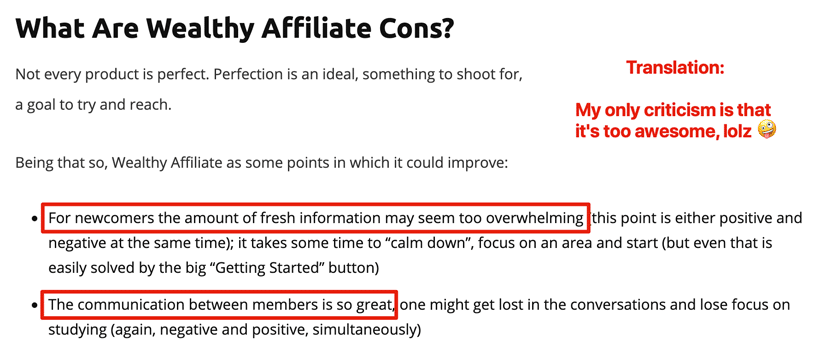
According to money.howstuffworks.com:
The main characteristic of a pyramid scheme is that participants only make money by recruiting more members.
Courses such as Wealthy Affiliate and Six Figure Mentors fit that description a little too well.
Take this WA member, for example:
She reports that she earned $40,000 in one year from affiliate marketing.
And at the 4:30 mark of the above video, she shows that a full 75% of those earnings came from referring other people to Wealthy Affiliate.
Now I have nothing against someone earning most of their affiliate income from recommending a particular affiliate marketing program.
(If this article you’re reading ranks well, I could easily end up in that situation myself!)
But Wealthy Affiliate and Six Figure Mentors are exceptional here because the vast majority of their “successful” students appear to be earning the bulk of their affiliate income this way.
And it’s easy to see why:
Ideally, what you want to see from an affiliate marketing training program is lots of students having success in many different niches.
And NOT just students having success mainly by recruiting other students.
This is how you can tell if an affiliate marketing course sucks before you buy it…
Again: if the course you’re considering checks most or all of those boxes, don’t sign up for it.
Are there any other “red flags” you look for when evaluating a course on affiliate marketing?
Below are my picks, based on the 450+ hours I’ve personally spent buying, researching and testing a bunch of AM courses.
Is it 100% accurate that in order to succeed at e-commerce and affiliate website sales one must go through social media? Be involved with those platforms in every way?
No, that’s not accurate. You can succeed with e-commerce or affiliate marketing without using any social media. For example, you could just focus on SEO or PPC instead.
Hi. When will you give a review of Adam Cherrington? Have you seen his web invitation (only) walkthrough workshop? I have and it’s pretty convincing. I noticed only a couple red flags but he’s keeping his trainees to a small class. At 10k a pop that’s x 15 last year, and 50 this year. I’m thinking about joining. That’s if I’m accepted. There’s a screening to go through before you start. Maybe I won’t be accepted. And if I am can I take out small loan from you. 8f this kind of money is j my future I will have no problem paying it back.!!! Winning!!!!
Adam Cherrington is on our list but not sure when we’ll get to him. But are you saying his program costs $10,000 and you have to go through a screening call to get “accepted”? If so, that’s a massive red flag. If you are new to affiliate marketing, I would strongly advise against investing so much money into something you still have a lot to learn about. Start with free/cheap courses, learn the basics, and then you’ll be better able to evaluate what opportunities are worth investing significant money in.
Hey, Niall
What if the testimonials do include promising figures, but no links to the website that supposedly makes them the money?
That’s not necessarily a red flag. Some affiliates prefer not to publicize their websites for fear of competition. For example, if you build a site in a certain niche and start crushing it, then tell everyone how well you’re doing… there’s a higher chance that other people will want to enter than niche and try compete with you. In my experience, it’s actually unusual to see successful affiliates revealing their sites. The ones who do are usually so successful and established that they’re not too worried about competition.
Thanks for clearing that up.
Hey Niall,
I really hope that you can help me with this as I want to help one of my close friends and hope that he doesn’t make a bad investment. Basically, how do you know whether positive testimonials are legitimate. My friend wants to purchase a course from endmyopia.org and says that there are many positive success stories and testimonials that support the program. However, it seems to be based on pseudoscience (kind of like homeopathy except for nearsightedness) but I don’t really know how to explain away all the success stories. What do you think? I would be grateful for any help!
Hi Aaron,
I can’t really help you here, sorry. I can spot questionable things with an affiliate marketing course easily enough, but what you’re referring to is medicine/biology, and I have no training or experience with that. It would be better to ask a medical professional.
Hey Niall,
I’ve asked some optometrists and medical professionals and they’re saying that the course isn’t based on any sort of science and is snake oil. However, like I said, I don’t know how to explain away all the success stories. Is it reasonable to assume that they’re all fake? However, I see many success stories online, is it that easy to fake testimonials?
Testimonials can be faked but I think it’s more likely that they’re real testimonials from real people. The same way you can probably find real testimonials from real people about homeopathy, or real testimonials from real people about Wealthy Affiliate (an affiliate marketing course that I rated poorly).
Such testimonials don’t necessarily mean that the thing is legit. It just means that a lot of people believe in it and are convinced it’s working for them.
Also, trying hard to talk your friend out of this might actually have the opposite effect. The more you try to convince some people of something, the more they dig their heels in.
You make a good point regarding convincing my friend. I’m pretty naive about these sort of things so please bear with me as I have some final questions related to this. If homeopathy is obviously pseudoscience and doesn’t work, how can you find real people that claim to have benefitted from it? Doesn’t this mean that the medicine works? Similarly, regarding Wealthy Affliate, if many people believe that the system is working for them, doesn’t that mean that the course is quality? How does it not mean that it’s legit?
My understanding is that it’s simply the placebo effect, which is fascinating and powerful in itself. Pseudoscience practitioners often take something that can be explained by the placebo effect and credit their potion/technique instead.
From what I’ve seen, most of the people who passionately defend WA aren’t actually making much money from affiliate marketing – but they believe they will if they just keep following the training. Or, if they are making money, it’s mainly by convincing other people to sign up to WA through their affiliate link.
Some people have been in WA for years and haven’t made much money but say they love interacting with the community and that makes the membership worth it for them. Which is fine, but “community” surely wasn’t the reason they signed up to WA in the first place. They wanted to make money. When WA failed to help them do that, they decided to move the goal posts rather than admit to themselves that they’d wasted loads of time and money.
I remember reading about a UFO cult that believed the world would end and humanity destroyed on a particular date, but the cult members would be saved by aliens. When it didn’t happen, instead of admitting they’d been wrong, they convinced themselves that their strong belief had somehow saved humanity.
Bottom line: humans are capable of all sorts of mental hijinks to justify bad decisions. And unfortunately, you can’t cure illogical beliefs with logic.
I appreciate the effort you put into these comments! Just one last thing, regarding Wealthy Affiliate, I see a lot of reviews online that say it’s one of (if not) the best affiliate marketing course there is (which shows that I’m getting my reviews from unreliable sources). Do you have any suggestions for other websites that reliably review courses such as yours?
There’s not really any website I’d recommend totally. Miles Beckler’s channel on YouTube is probably the most reliable source of info, especially since he doesn’t have any course for sale himself.
Alright, that’s all the questions that I have. Thank you for you patience!
Hey Niall,
Sorry for bothering you again, but I was thinking about this and wanted to hear your input on it. Now that I think about it, why do you consider testimonials to be an important part when reviewing a course? Doesn’t it suffer from the same problems like it does regarding pseudoscience (the person could’ve improved despite the course, they may be lying, etc.)? If so, when reviewing a course, shouldn’t testimonials not matter and only the content of the course should be reviewed?
The content of the course doesn’t really matter if people aren’t getting good results with it. The content could sound great in theory but might be ineffective in reality. So I’d say the results/testimonials matter more.
Yes, testimonials can be faked, but if names are shown then it’s usually easy enough to research the people and see if they’re the real deal. I’ve done that with many of my reviews (Sam Ovens, John Crestani, etc). Sometimes when I buy a course I’ll get access to the private community for it and you can see in there what kind of results people are really getting.
I think the main issue I’m having is not knowing whether a testimonial is fake or not. How do you do it?
If they show the person’s full name, google them and see what you can find. They may be on Twitter or have a blog and you might see from those if something doesn’t add up. Maybe contact them and ask if they actually said that about the program and if they still stand by it.
If the testimonials are screenshots from a private community, you can join the program, go into the community, and find the posts the screenshots were taken from, see if anything looks amiss.
If the testimonials are anonymous or there’s no way to fact-check them, they might still be real but you should be skeptical.
Overall, it’s more of an art than a science. Just keep digging and snooping around and you’ll eventually get a sense of whether the testimonials for a particular program are trustworthy or not. You’ll probably never be 100% sure, but you’ll find enough to make a fair call.
I see, what if the testimonials are in a video format? How are you supposed to check that they aren’t getting paid to say this?
Like I said, you never know for sure. But research the names, claims and faces and you can usually tell if it’s legit or not.
That makes sense, thanks! Do you have any course reviews coming soon?
Nothing planned for the next month at least!